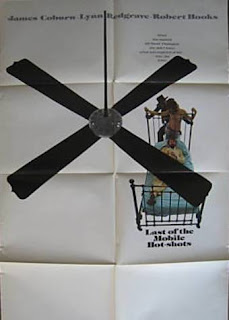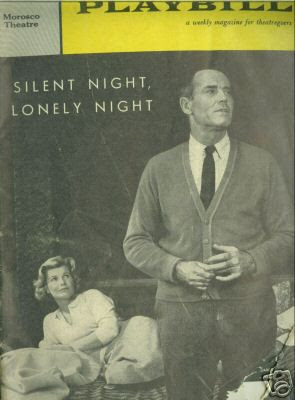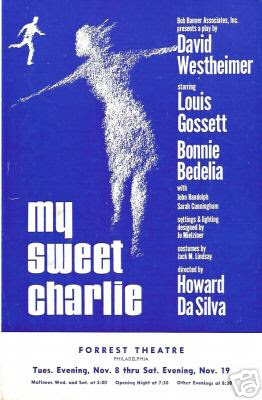But there was a time when the studios depended seriously on Broadway as a source for its prestige productions. (There's been a curious flipflop in the past two decades with the B movie - action films and action comedies - now being given the lavish adornments once reserved for message/Oscar films exclusively.) Hollywood had such an unquenchable need to film plays that even stage productions that were flops and folded quickly (but were not necessarily bad) quickly became movies.
To name a few...
"Little Murders"
Written by the popular acerbic cartoonist Jules Feiffer, the very dark "Little Murders" opened at the Booth Theater on April 18th, 1967, playing a total of seven performances. The play starred singer Barbara Cook (in a decidedly non-singing role) and Elliott Gould, just before he hit Hollywood with William Friedkin's "The Night They Raided Minsky's" and Paul Mazursky's "Bob and Carol and Ted and Alice."

Feiffer comically chronicled what happens when a gung-ho all-American girl brings an inarguably unAmerican guy (a self-described "apathist" who photographs dog excrement for a living) home to meet her family - an oblivious mother, a father embarrassed by his name (it's Carroll) and a brother who wants to be a woman, played by Ruth White, John Randolph and David Steinberg, respectively. Exacerbating the tension are such modern travials as power outages, a garbage strike and serial murders.
Heyward Hale Broun, Phil Leeds and Dick Schaal rounded out the cast, under the direction of George Sherman.
A subsequent 1969 staging at the Circle in the Square also starred Gould and Steinberg, along with Linda Lavin, Vincent Gardenia and Donald Sutherland in the role of a hippie cleric.
Gould, of course, recreated his role for the 1971 film, which was gamely directed by Alan Arkin who also assumed the role of the quickly uncoiling detective investigating the murders. The wonderful Marcia Rodd (and exactly what happened to her?) is a standout in the Cook role of Patsy; Elizabeth Wilson and an encoring Gardenia play her parents and Jon Korkes her brother, and Sutherland was back on board as the minister.

"The Seven Descents of Myrtle"/"Last of the Mobile Hotshots"
Tennessee Williams' "The Seven Descents of Myrtle" had a tryout at the Walnut Street Theater in Philadelphia and opened March 27th, 1968 at the Ethel Barrymore Theatre, with a cast consisting of Estelle Parsons, Harry Gaurdino and Brian Bedford, under the direction of José Quintero.

OK, here goes: Williams' play is about Lot (Bedford), a tubercular, impotent transvestite who has taken a wife named Myrtle (Parsons) who, in turn, is a prostitute and former showgirl, the sole survivor of the Five Memphis Hot Shots. Myrtle lives to nurse Lot back to health but Lot cares only about stealing the family property from his multiracial half-brother, Chicken (Guardino).
Naturally, Chicken is attracted to Myrtle.
"The Seven Descents of Myrtle" closed after 29 performances.
Sidney Lumet directed the 1970 film version, which was retitled "Last of the Mobile Hotshots" and was one of the few prestige films of that era to be rated X by the MPAA. Lynn Redgrave starred as Myrtle, James Coburn as Lot (renamed Jeb actually for the film), and Robert Hooks as Chicken.
The film was made in New Orleans and St. Francisville, Louisiana, but forget the scenery. All that counted here was the idea of James Coburn playing a transvestite.

"A Loss of Roses"/"The Stripper"
William Inge's "A Loss of Roses," which opened December 7th, 1959, at the Eugene O'Neill Theater and closed after 25 performances, remains Warren Beatty's only Broadway appearance. His co-stars were dancer Carol Haney (in a decidedly undancing performance), Betty Field, Robert Webber, James O'Rear, Margaret Braidwood and Michael J. Pollard who, of course, would appear with Beatty in Arthur Penn's "Bonnie and Clyde."
Daniel Mann directed.
Its plot revolves around Lila (Haney), a sensitive, aging showgirl for a series of shows staged by a Madame Olga. When her boyfriend, Rick (Beatty), steals the show's boxoffice receipts, Lila is fired and opts to change her life. But then Rick returns.
 For the 1963 film, directed by Franklin J. Schafner, Joanne Woodward and Richard Beymer play Lila and Rick, with Webber and Pollard recreating their stage roles. The rest of the cast includes Claire Trevor, Carol Lynley, Louis Nye and ... Gypsy Rose Lee as Madam Olga.
For the 1963 film, directed by Franklin J. Schafner, Joanne Woodward and Richard Beymer play Lila and Rick, with Webber and Pollard recreating their stage roles. The rest of the cast includes Claire Trevor, Carol Lynley, Louis Nye and ... Gypsy Rose Lee as Madam Olga. "Silent Night, Lonely Night"
"Silent Night, Lonely Night"The estimable Robert Anderson (who penned "Tea and Sympathy" and "I Never Sang for My Father") wrote this lovely play about two lonely people - played by Henry Fonda and Barbara Bel Geddes - who have a chance meeting as a cozy New England inn during the Christmas holiday.
Each one is there for personal, troubling reasons.
The play, directed by Peter Glenville and co-starring Lois Nettleton, Bill Berger, Peter De Vise and Eda Hainemann, opened at the Morosco Theater on December 28th, 1959 and was snapped up immediately by Universal which then let the project linger for ten years.

The film version of "Silent Night, Lonely Night," directed by Daniel Petrie, was not made for theaters, but for TV. Nevertheless, it's an excellent movie, intimate and involving. Lloyd Bridges (outstanding) and Shirley Jones (an Emmy nominee) took over the Fonda-Bel Geddes roles, Carrie Snodgress played the Nettleton part and Lynn Carlin and Cloris Leachman showed up in roles created for the film by adapter John Vlahos, who wisely retained most of Anderson's script. Its dialogue is nearly verbetim.
 "My Sweet Charlie"
"My Sweet Charlie"David Westheimer's play "My Sweet Charlie" - a study in race relations - opened in tryout at the Forrest Theatre in Philadelphia on November 8th, 1966 before moving to New York's Longacre Theater onn December 6th, 1966, where it closed after 31 performances.
The actor Howard Da Silva ("They Live By Night," "The Great Gatsby," "The Blue Dahlia," "The Lost Weekend" and "1776" among many other films) directed a cast that included Louis Gossett, Jr. in the title role, Bonnie Bedelia, John Randolph and Sarah Cunningham.
Gossett's Charlie Roberts is a black New York lawyer accused - falsely - of murder in a small Texas town. He finds a vacant house where he hides out and this is where he meets Marlene (Bedelia), an artless, uneducated young woman who has been shunned by her father for being pregnant.
They become allies and unlikely friends.
The 1971 TV film version, also produced by Universal, was adapted by the then-hot team of William Link and Richard Levinson and directed by the great Lamont Johnson on location in Port Bolivar, Texas.
"My Sweet Charlie" was hugely popular as a film, thanks in large part to the affecting lead performances of Al Freeman, Jr. and Patty Duke. Ford Rainey took over the Randolph role.

(Artwork: Flyer art for the off-Broadway production of "Little Murders" and Marcia Rodd and Elliott Gould in the film version; Playbill for "The Seven Descents of Myrtle" and the poster for its movie version, "Last of the Mobile Hotshots"; Playbill for "A Loss of Roses" and the poster art for its film version, retitled "The Stripper"; Playbill for "Silent Night, Lonely Night" and the dustjacket for the VHS of the movie version, and the flyer for the Philadelphia tryout of "My Sweet Charlie" and the dustjacket for the video of the film)
No comments:
Post a Comment